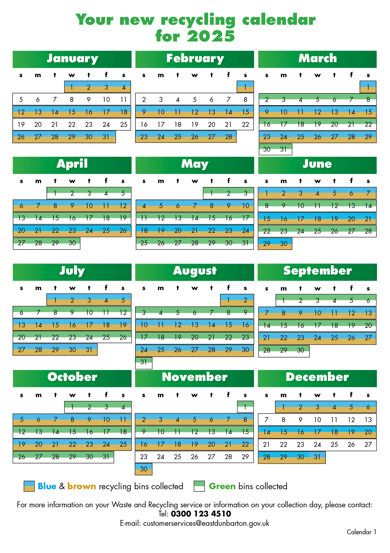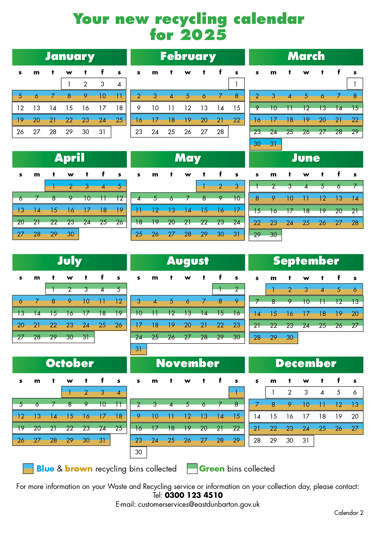Bins and recycling
East Dunbartonshire Council collects waste and recycling seven days a week.
Food waste may be collected on a different day from your recycling or general waste.
To make sure your bin is emptied, the lid must be fully closed and the bin placed at the kerbside or collection point by 7am.
General waste (grey bin) collection day
View the General Waste street A-Z to check your new collection day for the launch of three-weekly general waste collections. Plans are still being put in place for a small number of rural homes and these will be added to the street A-Z as soon as possible
A list of street names and new collection dates have also been printed into booklets that can be viewed at any of our Community Hubs from the week commencing Monday 17 March.
A new online search tool to help you find your collection day quickly and easier is currently in development and will be available on this page in the near future.
Please note – a number of properties will exceed a 21-day period between their last fortnightly waste collection and their first three-weekly waste collection. A one-off contingency collection to support these households with the transition will be carried out by our Waste team.
View our Contingency Collection street A-Z to see if your property will be affected. The properties affected will receive a letter detailing the arrangements for a one-off collection of their grey bin in the week commencing Monday 31 March 2025.
Recycling (blue bin, orange bin, green bin, food caddy) collection calendar
All Recycling collection days will remain the same.
View the Recycling street A-Z to check your collection day and calendar.
You can view your Recycling Calendar below.
Calendar 1

Calendar 2

Garden waste collection
Since 7 July 2024 there is a charge of £50 per green bin for the collection of garden waste. The garden waste permit application form is now open for the 2025 season.
Visit the Garden waste collection page to apply.
General waste
All household waste (rubbish) that cannot be recycled. View our Frequently Asked Questions for information on our general waste bin charges.
Paper and cardboard
- Paper
- Newspaper
- Cardboard
- Junk mail
- Magazines
- Catalogues
- Telephone directories
Please DO NOT put the following in your blue bin:
- Pizza boxes
- Packaging contaminated with food
Plastic, glass and cans
- Glass jars
- Glass bottles
- Aerosol cans
- Food tins
- Drink cans
- Clean Tin foil
- Plastic bags e.g. carrier bags, bread or vegetable bags
- Plastic bottles e.g. juice, milk, bleach and cleaning bottles
- Plastic trays e.g. from microwave meals and fruit punnets
- Plastic pots e.g. yoghurt pots, pudding pots, noodle and soup pots
- Plastic tubs e.g. margarine or ice cream tubs
Please ensure all plastics have been rinsed and squashed and all cans have been emptied and rinsed before disposing of them. Top tip - rinse your recycling after washing your dishes to save water.
Garden waste
Please do not put large amounts of soil or turf in the green bin as it will not be collected
- Flowers
- Plants
- Grass cuttings
- Shrub/Hedge clippings
- Leaves
- Weeds (not invasive plants like Japanese Knotweed)
- Twigs/Branches
- Straw or animal bedding
Food waste
- Cereal and grains
- Bread and pastries
- Cooked and raw fish
- Cooked and raw meat
- Eggs and dairy (including egg shells)
- Tea bags and coffee grounds
- Rice and pasta
- Out of date food
- Spoiled or excess food
- Fruit and vegetables
- Bones
Please DO NOT put the following in your grey food caddy:
- Napkins and paper towels
- Packaging of any sort
- Clingfilm and plastic bags
- Fats, oils and grease unless solidified
- Cutlery and crockery
- Bottles, cans and jars
- Aluminium foil
Note: Gas canisters for bbqs, outdoor heaters and camping stoves or helium canisters to inflate balloons should not be placed in any household waste bins as they cause a major safety risk when disposed of incorrectly. Please take canisters to our Household Waste Recycling Centre at Mavis Valley, Bishopbriggs.
If you have extra or additional waste that will not fit in your bin you can arrange for a Special uplift or dispose of this yourself at Mavis Valley recycling centre.
Right bin? Put it in
Report a missed bin
Before reporting a missed bin please ensure that:
- Your bin was on the kerbside from 7am on your scheduled collection day.
- You have put your bin out on the right day - check your Collection Day above.
- The lid is fully closed.
- If it is a recycling bin, that the correct items are in it.
- Access to the bin is not blocked by roadworks or parked cars.
If your bin has been missed please fill in the missed bin form.
Please note: Missed bins must be reported within 48 hours.
Waste collection assistance
East Dunbartonshire Council can help residents who can’t get their bins to the kerb side. This help is only available to residents who meet certain criteria. You will need to apply for the help and we will consider your:
- Age
- Type of home
- Health
- Disability
If you are accepted then we will agree where your bins will be collected from and returned to and when the first collection will happen.
You can complete the online form below, contact Customer Services or get someone to do this on your behalf. You can also request help behalf of another.
We will check your application, which may include a home survey. We will mutually agree a convenient time for the visit.
This service is reviewed on a regular basis. Reviews will be based on the details provided.
If you would like to appeal, contact Waste within ten working days on tel: 0300 123 4510. The appeal will need to evidence relating to rejection.
Apply for waste collection assistance
Replacement bins
There is currently a charge of £52.00 for your first or a replacement grey general waste bin. For replacement bins please complete our bin supply and removal form below or telephone Customer Services on 0300 123 4510.
Removal of Bins
You can apply for your bins to be removed at no charge by completing our replacement/removal bin form below. All bins remain the property of East Dunbartonshire Council so should only be removed officially by our Waste team.
For replacement or removal of bins please complete our bin supply and removal form
Purchase a domestic grey bin
Please use the form below to purchase a domestic grey bin.
Compost your garden waste
Full information on home composting can be found at Zero Waste Scotland Home Composting. You can buy composters at garden centres, supermarkets and online.
Recycling energy saving light bulbs
You can recycle your energy saving light bulbs at our Mavis Valley Recycling Centre. Please tell a member of staff when you arrive that you would like to recycle light bulbs.
What are real nappies?
Modern real nappies are very practical and offer parents and parents-to-be an alternative to disposable nappies.
Real nappies are made of lightweight, fluffy fabrics which can be machine washed and reused over and over again, while disposable nappies can only be used once.
Benefits of using real nappies
Benefits of using real nappies include:
- Can save you money.
- Convenient to wash and dry.
- Easy to use and comfortable for baby.
- Reduces your household waste, which goes to landfill sites.
- Available in a variety of styles, materials and sizes there is one to suit every pocket and lifestyle.
Cost
On average a baby goes through 5,000 disposable nappies, a cost of around £650 to £1300. A set of 'real' nappies costs £150 or less.
Environmental
In the UK, 8 million nappies a day are sent to landfill. Studies show that you can reduce your environmental effect by up to 40% by choosing reusable nappies.
Convenience and comfort
'Real' nappies are shaped to fit, like disposable nappies. Some can be adjusted to fit from birth up to potty training.
Flexibility
Use 'real' nappies to suit your lifestyle, perhaps switching from reusable, at home, to disposables when out and about.

